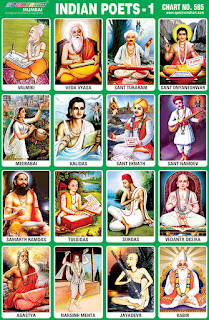 |
| Indian Poets 1 Chart |
Spectrum Chart - 585 : Indian Poets 1
1. Valmiki – Valmiki is celebrated as
the harbinger-poet in Sanskrit literature. The epic Ramayana, is
attributed to him. He is revered as the Adi Kavi, which translates to
First Poet, because he is said to have invented shloka, which set the
base and defined the form to Sanskrit poetry.
2. Veda Vyasa - Veda Vyasa is considered
the author of the Mahabharata, as well as a character in it. He is
considered to be the scribe of both the Vedas and Puranas. Vyasa is
also considered to be one of the seven Chiranjivins, who are still in
existence according to Hindu belief. The festival of Guru Purnima is
dedicated to him.
3. Sant Tukaram – Sant Tukaram was a
17th-century poet-saint of the Bhakti movement in Maharashtra.
Tukaram is known for his Abhanga devotional poetry and spiritual
songs known as kirtans. His poetry was devoted to Vitthala or
Vithoba, an avatar of Hindu god Vishnu.
4. Sant Dnyaneshwar – Sant Dnyaneshwar
was a 13th-century Marathi saint, poet, philosopher and yogi of the
Nath tradition whose Dnyaneshvari & Amrutanubhav are considered
to be milestones in Marathi literature.
5. Meerabai - Meerabai, was a 16th century
Hindu mystic poet and devotee of Krishna. Thousands of devotional
poems in passionate praise of Lord Krishna are attributed to Meerabai
in the Indian tradition. These poems are commonly known as bhajans,
and are popular across India.
6. Kalidas – Kalidasa was a classical
sanskrit writer, widely regarded as the greatest poet and dramatist
in the Sanskrit language. His plays and poetry are primarily based on
the Hindu Puranas. Kalidasa is the author of two epic poems,
Raghuvamsa and Kumarasambhava.
7. Sant Eknath - Sant Ekanath was a
prominent Marathi sant, scholar, and religious poet of the Varkari
sampradaya. Eknath wrote Rukmini Swayamwar Hastamalak, which was
comprised 764 owees and based on a 14-shlok Sanskrit hymn with the
same name by Shankaracharya.
8. Sant Namdev - Namdeo was a poet-saint
from Maharashtra, who is significant to the Varkari sect of Hinduism.
He is also venerated in Sikhism, as well as Hindu warrior-ascetic
traditions such as the Dadupanthis and the Niranjani Sampraday.
9. Samarth Ramdas - Ramdas was a noted
17th-century saint and spiritual poet of Maharashtra. He is most
remembered for his Advaita Vendatist text, the Dasbodh. His most
popular composition is the Marathi Aarti to Lord Ganesh Sukhakarta
Dukhaharta. He has written Aarti of almost all Gods.
10. Tulsidas - Tulsidas was a Hindu
poet-saint, reformer and philosopher. He has been acclaimed as one of
the greatest poets in Hindi, Indian and world literature. Tulsidas
started composing poetry in Sanskrit in Varanasi on the Prahlada
Ghat.
11. Surdas - Surdas was a late 15th-century
blind saint, poet and musician, known for his devotional songs
dedicated to Lord Krishna. Surdas is said to have written and
composed a hundred thousand songs in his magnum opus the 'Sur Sagar'.
He is considered a saguna bhakti poet.
12. Vedanta Desika - Vedanta Desika was a
poet, devotee, philosopher and master-teacher. Swami Desika was a
prolific writer in tamil and Sanskrit expounding Prapati and Bhakti
and about 116 works, big and small, are to his credit.
13. Agastya – Agastya is one of the
ancient saptarshis, a revered Vedic sage and the earliest Siddhar. He
is also believed to be the author of Agastya Samhita.
14. Narsinh Mehta - Narsinh Mehta was a
poet-saint of Gujarat, India, notable as a bhakta, an exponent of
Vaishnava poetry. He is especially revered in Gujarati literature,
where he is acclaimed as its Adi Kavi.
15. Jayadeva – Jayadeva was a Sanskrit
poet. He is most known for his epic poem Gita Govinda, which depicts
the divine love of Krishna and his consort, Radha. Jayadeva was
instrumental in popularizing the Dasavatara, the ten incarnations of
Vishnu.
16. Kabir – Kabir was a 15th-century
Indian mystic poet and saint. Kabir composed poems in a pithy and
earthy style, fused with imagery. His poems were in vernacular Hindi,
borrowing from various dialects including Avadhi, Braj and Bhojpuri.
They cover various aspects of life and call for a loving devotion for
God.

No comments:
Post a Comment